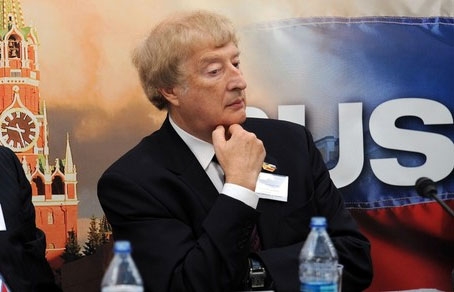
Edward Lozansky
Edward Lozansky is president of the American University in Moscow, Professor of World Politics at Moscow Sate University
The latest news from Moscow is the offer by Putin to provide $15 billion in loans and a sharp discount on natural gas prices to rescue Ukraine from potential default. Are Washington and Brussels ready to match this offer?
Imagine how Americans would react if Russian Foreign Minister Sergei Lavrov made public appeals to them not to sign up for Obamacare, while his deputy served vodka and caviar to Tea party activists during their protest marches in Washington.
And yet, although on a different subject, this is exactly what John Kerry and his deputy Victoria Nuland have been doing last week vis-a-vis Ukraine. Kerry has been publicly and vocally urging Ukrainian President Viktor Yanukovych and his government "to listen to the voices of his people who want peace, justice and a European future.” Meanwhile Nuland has been schmoozing with anti-Yanukovich protesters in Kyiv’s Maidan Square and seen serving cookies to the crowd in a dubious PR stunt. And it doesn’t seem to bother either Kerry or Nuland that a part of these protesters belonged to the openly pro-Nazi groups.
Does anyone doubt that the best friend of former Georgian president Saakashvili (who, by the way, is not expected in his native country anytime soon fearing prosecution for numerous crimes) would miss the opportunity to poke his finger in the bear’s eye? Predictably enough, McCain rushed to Kyiv to support the opposition and apparently to tell them that from now on in addition to being ein Georgian he is also ein Ukrainian. One can only wonder which nationality he will adopt next.
Ukraine is indeed at a crossroads, torn apart by the almost evenly divided pro-Russian East and pro-European Union West. This is the unfortunate legacy left by Soviet dictator Josef Stalin, who annexed western Ukraine from Poland in 1939. Nevertheless, as a sovereign nation the country and its people alone can make this vitally urgent decision.
One should admit that while Moscow is using a wait-and-see approach, U.S. and European officials do not hesitate to take sides and keep showing up at the demonstrations against the democratically elected government of Ukraine. Such unprecedented pressure is not only counterproductive but is harmful to U.S. – Russia relations, which have already been deeply damaged by the earlier disagreements. Does such a policy serve America best? Don’t we have enough trouble in the Middle East and with the constantly growing geopolitical challenge in South East Asia? Isn’t Russia our logical ally in the war on terror?
Obama keeps claiming that al Qaeda is "decimated” and "on the run.” Is it really? According to Washington Times "his intelligence team was privately offering a different assessment that the terrorist movement was shifting resources and capabilities to emerging spinoff groups in Africa that posed fresh threats to American security.”
Russia is on the front lines in the struggle with Islamist radicals, and is our logical partner in this civilizational conflict. So, why are we trying to deny its legitimate trade and security interests in neighboring Ukraine, which is linked to Russia for centuries by family, historical, cultural and religious roots? There is hardly a Russian family without close or distant relatives in Ukraine and vice versa.
From purely economic point of view Ukraine with its empty treasury and mountainous debts is rather a big burden rather than huge prize for EU or Russia.
However, Russia must protect its producers against a flood of European products that would inevitably swamp its markets if Ukraine were to sign the EU Association Agreement. In that case, Russia would have to raise prohibitive customs tariffs that would further cripple Ukraine's economy, and that's exactly what President Yanukovich and his team fear.
My contention merely is that Ukraine's friends in Europe and America should also be aware of these facts - if they really wish Ukrainians well, and are not merely playing geopolitical computer games, pushing flags around the map.
As for Washington elites, they can’t articulate any true strategic interest America has in Ukraine besides weakening Russia, which as stated above in the long run is counterproductive to U.S. and our allies’ security.
The smart policy for EU had to be the invitation to join their Eastern Partnership not only six former Soviet republics but at least seven, adding Russia to the list. Yes, its democracy level is far from perfect but among the six that have been invited are Belarus and Azerbaijan whose democratic credentials are much worse. At a minimum, taking into account how strongly the Ukrainian economy is intertwined with Russia’s, not to mention the 3 million plus Ukrainians who support their families back home through monies earned in Russia, a three-way EU – Russia – Ukraine negotiations should be the obvious course to follow.
However, the EU has rejected this idea out of hand, thus proving that the real objectives for Washington and Brussels are primarily geopolitical rather than economic.



.jpg/250px-ElbeDay1945_(NARA_ww2-121).jpg)





